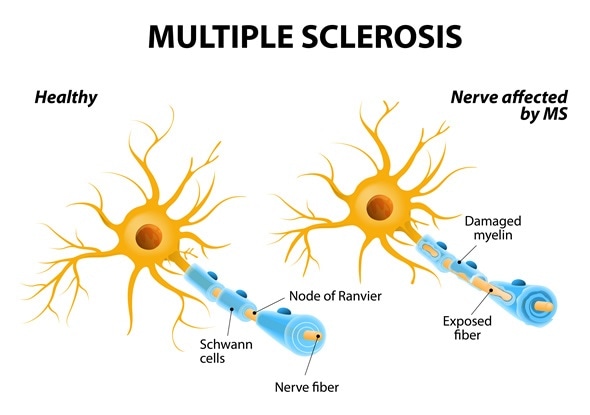
Treatment of Multiple Sclerosis
There is no cure for multiple sclerosis. Treatment typically focuses on speeding recovery from attacks, slowing

We have always believed that our immune system is our shield when it comes to combating various bacteria and diseases, never in our minds have we considered what may happen if our immune system itself turns its back on us.
Multiple Sclerosis (MS) is a chronic and potentially incapacitating disease wherein your own body’s immune system attacks the myelin, which serves as the protective sheath covering your nerves. It affects both the brain and spinal cord as well as the optic nerves, and may lead to the irreversible deterioration of the nerves. Because of the damage to the myelin, the communication between your brain, spinal cord and other areas of your body may be hindered.
Signs and Symptoms
Symptoms usually differ depending on the amount of damage and the nerves that are affected. In the early stage of MS, you may experience weakness, tingling, numbness, and blurred vision. Also, you may have muscle stiffness, thinking problems, and urinary problems. You may experience numbness of limbs in milder cases of MS, while those who have severe cases of multiple sclerosis may lose the ability to walk or speak clearly. They may be paralyzed or blinded.
Symptoms typically emerge initially between 15 and 45 years of age and women are twice as likely to get MS than men. Also, another thing to be considered when it comes to dealing with people with MS is that they are heat sensitive. Heat sensitivity is common in people with multiple sclerosis especially as the condition advances, and even small increases in body temperature can activate or worsen multiple sclerosis symptoms.
Diagnosis
Symptoms may come and go, and this makes diagnosing MS in its early stage a bit difficult. They may sometimes disappear for months.
MRI is a giant step in confirming a diagnosis, however, since 5% of people with MS do not have abnormalities detected on MRI, a “negative” scan does not completely rule out MS. Some common changes of aging may look like MS on a MRI. Repeat scans may also be done in order to monitor and determine the status of their disease and how well their medications are working.
Spinal Tap may also be done wherein the spinal fluid of the patient with MS is examined. It may provide findings that point out an unusual autoimmune response within the brain and spinal cord such as large number of immunoglobulins present in the fluid and certain proteins that are the breakdown products of myelin, which is suggestive of MS.
Treatment
Corticosteroids are the most prescribe medications in patients with MS as these drugs reduce inflammation which may be a problem when MS relapse occurs. Interferons may also be given in order to slow down the progression of worsening MS symptoms however, it must be given cautiously as it damages the liver. Copaxone (Glatiramer) may be prescribed in order to stop the immune system from attacking myelin. However, the patient may experience flushing and shortness of breath after receiving the injection.
Plasma exchange (plasmapheresis) may also be done as it takes out the antibodies in the blood that are attacking parts of the patient’s body they should not be attacking. Here, plasma is removed from the blood and replaced with new plasma, and with all its red and white blood cells it is transfused back into the patient.
Care for patients with MS is focused on managing bowel and urinary problems, heat sensitivity, managing speech and swallowing problems, and treating MS pain.

There is no cure for multiple sclerosis. Treatment typically focuses on speeding recovery from attacks, slowing
Medical Referral | Accident Attorney Referrals
Filter out the noise and nurture your inbox with health and wellness advice that’s inclusive and rooted in medical expertise.
MedicalReferral.com does not provide medical advice, diagnosis, or treatment.